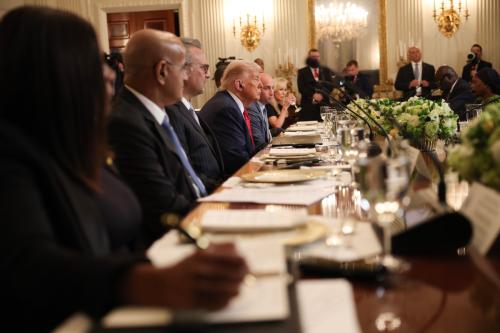As part of its efforts to sanction Iran, the US has recently been pressuring international banks and foreign governments to deny Iran loans for expansion of its oil production. Can and should “loan sanctions” be used more broadly as part of the toolkit of international diplomacy? If so, when and how?
In the case of Iran, sanctions are being applied out of concern that the regime poses an international security threat, but in other cases the international community imposes sanctions because a regime is mistreating its own population (e.g. South Africa in the 1980’s, Burma today). A number of dictators have borrowed internationally, stolen the proceeds or used them to finance repression, and then saddled successor regimes and their populations with the debt.
Loan sanctions could be particularly effective in these cases. Currently, many creditors lend to governments without regard to their legitimacy. And when illegitimate governments saddle countries with debt, successor governments typically repay the loans. For example, South Africa today is repaying apartheid-era debt. Its rationale is that repudiating the debt would hurt its reputation in capital markets.
Wealthy countries could discourage repayment of illegitimate debt, and in turn discourage lending to sanctioned regimes in the first place, by announcing that they will consider future loans to sanctioned regimes to be illegitimate. The US and other countries could disallow assets held abroad by legitimate successor governments from being seized to enforce payment of this debt. They could further announce that they will not provide foreign aid to successor governments of illegitimate regimes if those successor governments repay illegitimate debts.
This type of loan sanction puts creditors on notice that any future loans to a regime would be considered the responsibility of that regime only and nontransferable to successor governments. The US would not need to pressure creditors to withhold credit, as it has had to do in the case of Iran. Creditors would stop lending simply out of profit motives.
Trade sanctions are often ineffective because they create incentives for evasion by third parties; when effective, they often harm the population of the target country as much as the targeted regime. Loan sanctions, particularly when applied against regimes that are repressive and corrupt, overcome these problems. There would be few incentives for a creditor to evade a loan sanction and lend to a sanctioned regime if the citizens view the borrowing regime as illegitimate and would not hesitate to repudiate the debt in the future. In addition, loan sanctions can help the population and inflict targeted damage on a dictator who is stealing or otherwise misusing money. The sanction delivers a large benefit to the citizens by reducing the country’s debt burden, which likely would outweigh any short-term hardship from less money flowing into the country.
Beyond punishing dictators, loan sanctions fill a fundamental gap in the debt relief movement. To date relief policies have helped write off debt in the poorest countries but have taken little action regarding the loans that other poor countries, such as South Africa, have illegitimately inherited. Loan sanctions would help address that issue directly.
A policy of nullifying past debt raises the concern that creditors might stop lending to legitimate governments for fear that the loans will disingenuously be deemed illegitimate in the future as a way to help the debtor. Deeming only future loans as illegitimate¿those issued after the loan sanction is imposed¿avoids this problem.
Some potential target regimes run their country into the ground economically and cannot borrow, even without loan sanctions in place. In other cases, major powers might protect an illegitimate regime from loan (and other) sanctions for strategic reasons. However, in cases where they could be applied, loan sanctions could be a potent diplomatic tool. Suppose there were a coup in, say, Nigeria and the international community wanted to respond. Imposing loan sanctions alongside trade sanctions would increase the impact that the international community could have.
There are important implementation issues. How should loan sanctions be structured to minimize uncertainty in the financial markets? Is there a way to allow humanitarian loans to flow to sanctioned governments, given that money is fungible? Despite these practical questions, though, loan sanctions can be a potentially valuable addition to the toolkit of international diplomacy.
…..
Seema Jayachandran is an Assistant Professor in the Stanford Department of Economics. Michael Kremer is the Gates Professor of Developing Societies in the Harvard University Department of Economics, Senior Fellow at The Brookings Institution, and Faculty Fellow, Center for International Development.
The Brookings Institution is committed to quality, independence, and impact.
We are supported by a diverse array of funders. In line with our values and policies, each Brookings publication represents the sole views of its author(s).



Commentary
Op-edLoan Sanctions: A New Tool for Diplomacy?
February 7, 2007